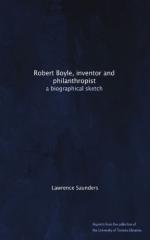|
This section contains 373 words (approx. 2 pages at 300 words per page) |
Mr. Robert Boyle, a Christian Gentleman
by Emily Dillie
Robert Boyle was born January 25, 1627, in Ireland, the son of the wealthy, famous, and well-respected Earl of Cork. His father, not wanting any of his fourteen children to grow up spoiled, sent all of his children to live with poor families until they were around four years of age.
When Robert returned home he had the best tutors and later went to the best school in England - Eton. Robert became impatient with many of his classes. Everything he was taught was taken from men who had died thousands of years before. Nothing new was being discovered.
Robert, with other like-minded scientists, held meetings where they discussed new ideas and did experiments. Robert called the group, "the invisible college," because of the new ideas they discussed. Robert urged the men of the invisible college to talk about their experiments to everyone giving detailed, but simple descriptions easy enough for anyone to understand.
Robert gave the first modern definition of an element - something that can not be made smaller by chemical means, nor can be made from two different substances.
Robert wrote of his experiments in his book, "The Skeptical Chemist," one of the most important chemistry books ever published. He wrote in a plain, simple, easy-to-understand style so that anyone could understand.
Robert noticed that previous chemists had discovered new things, but due to lack of communication to other chemists, the discoveries were never made known. The King agreed to charter the invisible college as the Royal Society. The group still meets today. It was the first group to ever regularly discuss experiments and new ideas.
Robert became very famous and the King often offered him high positions and titles, which Robert always refused. He did not want to be famous or rich. He preferred to be known simply as Mr. Robert Boyle, a Christian gentleman.
He remained a humble Christian throughout his life, even unto death. When he died in 1691, his will contained money for lectures, not on science, but on the defense of Christianity. They are called the Boyle lectures and are still given today.
Robert Boyle, Irish scientist and devout Christian, is considered the founder of modern chemistry.
|
This section contains 373 words (approx. 2 pages at 300 words per page) |


